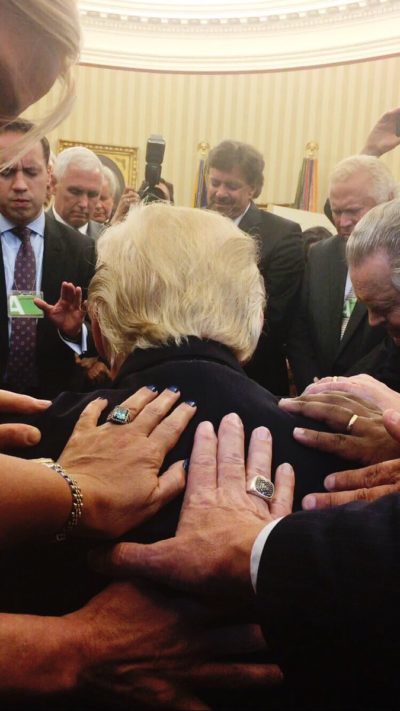Subtitle: As Rick Wilson says, “Everything Trump touches dies.”
As I read Sohrab Ahmari’s betrayal of conservative principles in First Things (!), I thought of those who predicted Trump would kill the GOP and conservatism (even this one). If Sohrab Ahmari speaks for Trump supporting religious conservatives, the never-Trump religious conservatives have been vindicated. Here is Ahmari relegating civility and decency to one’s own tribe:
But conservative Christians can’t afford these luxuries. Progressives understand that culture war means discrediting their opponents and weakening or destroying their institutions. Conservatives should approach the culture war with a similar realism. Civility and decency are secondary values. They regulate compliance with an established order and orthodoxy. We should seek to use these values to enforce our order and our orthodoxy, not pretend that they could ever be neutral. To recognize that enmity is real is its own kind of moral duty.
Ahmari wants to win the culture war and he doesn’t want to be nice about it. For Ahmari, nice in this essay is embodied by National Review writer and religious conservative David French. Curiously, what really set Ahmari off was a drag queen reading a book during a library story time.
I recently quipped on Twitter that there is no “polite, David French-ian third way around the cultural civil war.” (What prompted my ire was a Facebook ad for a children’s drag queen reading hour at a public library in Sacramento.)
I added, “The only way is through”—that is to say, to fight the culture war with the aim of defeating the enemy and enjoying the spoils in the form of a public square re-ordered to the common good and ultimately the Highest Good.
Ahmari complains that French is too nice and too wedded to pluralism to be of much help in winning the day for Christian morality.
Such talk—of politics as war and enmity—is thoroughly alien to French, I think, because he believes that the institutions of a technocratic market society are neutral zones that should, in theory, accommodate both traditional Christianity and the libertine ways and paganized ideology of the other side. Even if the latter—that is, the libertine and the pagan—predominate in elite institutions, French figures, then at least the former, traditional Christians, should be granted spaces in which to practice and preach what they sincerely believe.
Well, it doesn’t work out that way, and it hasn’t been working out that way for a long time…
Here is what I get out of Ahmari’s criticism of David French-ism:
- Fellow citizens of different faiths and beliefs and moral views are enemies of Ahmari’s brand of morality.
- To the degree that those citizens disagree with his morality and want to act in accord with that disagreement, they must be opposed without civility and decency.
- The salvation of individuals is insufficient to achieve the common good.
- The battle is a zero-sum situation. Ahmari’s team wins or the other side wins. Divergent views of what is morally good cannot coexist.
- Once the enemy is defeated, the righteous victors (Ahamri’s team) will enjoy “the spoils in the form of a public square re-ordered to the common good and ultimately the Highest Good.”
What else does Ahmari suggest as a conservative answer to moral decay? He leaves a lot to the imagination of his readers. He implies at one point that government might intervene in social media platforms where he believes conservatives have been censored. What about the drag queens? Does he want to violate freedom of expression, speech, and association? If so, how?
What would this re-ordered public square look like? Would businesses close on Sunday? Would store clerks have to say Merry Christmas? Surely, there would be no drag queens in libraries. Would they be allowed anywhere? Who gets to define the Highest Good? Ahmari tells us that culture will never favor Christianity so he must have something more top down in mind. I think he gives us a clue in his piece when he writes:
Conservative liberalism of the kind French embodies has a great horror of the state, of traditional authority and the use of the public power to advance the common good, including in the realm of public morality. That horror is a corollary to its autonomy-maximizing impulse.
This goes back, I think, to its roots in English non-conformism. In Culture and Anarchy, his great Victorian critique of this mode of thought, Matthew Arnold says of the nonconformist that, because he has encountered the Word of God by his own lights, he sees no need for the authority and grand liturgies of a national church (still less the Catholic Church).
But as Arnold notes, while the nonconformist vision of an austere, no-frills, solitary encounter with God might be suitable in one context, it doesn’t satisfy other necessities, such as collective public worship befitting public needs.
Ahmari adds:
Calls for religious revival are often little more than an idle wish that all men become moral, so that we might dispense with moral regulation.
Ahmari doesn’t like French-ism because he claims that French hopes individual salvation will make people moral and lead to a moral culture. Ahmari disagrees. He argues that “public power” and “moral regulation” will “advance the common good.”
So many questions come up. What is this “public power” and what are these “moral regulations?” Is it a state church? A oath to Dear Leader? Would Ahmari regulate drag queens? Libraries? The press? Free speech?
If this is Sohrab Ahmari-ism, I am against it.
David French?
Since attorney French has been a major player in religious liberty court cases, I would never have gone to him as a figure head for Ahmari’s opposition. Apparently, Ahmari doesn’t like French’s refusal to bow the knee to Trump and the fantasy of a Trump crafted “social cohesion.” However, reading French over the past two years, I think he is as fine as anyone to cast as a foil to Ahmari’s grand re-ordering plan. French knows who he is morally and spiritually, but he also writes convincingly about respect for freedom of conscience.
A serious problem with Ahmari’s plan to re-order the public square in his fuzzy image of the Highest Good (note the caps) is that such a re-ordering would have to rely on coercion. Someone’s conscience is going suffer. Ahmari doesn’t want it to be his so to hell with civility and decency. I mean that literally. If it takes hellish strategies to get the job done, then we must be realistic. The other side isn’t squeamish. And remember, the other side is made up of libertine pagans (Ahmari’s words), so they will surely use every demonic method available.
For Ahmari, these pagans aren’t just fellow homo sapiens who happen to see the world differently. On the other hand, French and his fellow French-ists respect the Constitutional freedoms available to all citizens. In his rebuttal to Ahmari, French made a point that is foundational to our ability to be one nation.
My political opponents are my fellow citizens. When I wore the uniform of my country, I was willing to die for them. Why would I think I’m at war with them now?
I agree. I get that Ahmari doesn’t like it when other people see the world differently and act on that difference. Most of us try to make the world more comfortable for us. Our founding documents ensure equal treatment before the law to pursue our aims. Ahmari also wants very much to do that for himself and those he likes. However, his ode to group serving bias isn’t a way forward for me, even though we may share some similar doctrinal beliefs. I can’t reconcile it with basic Constitutional freedoms which conservatives claim they want to conserve.

